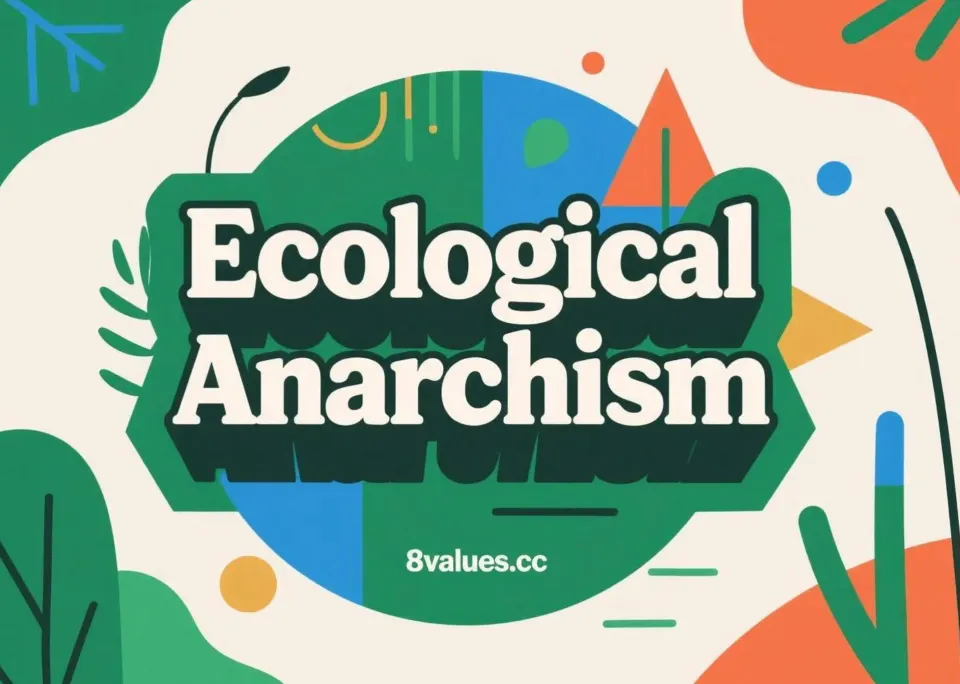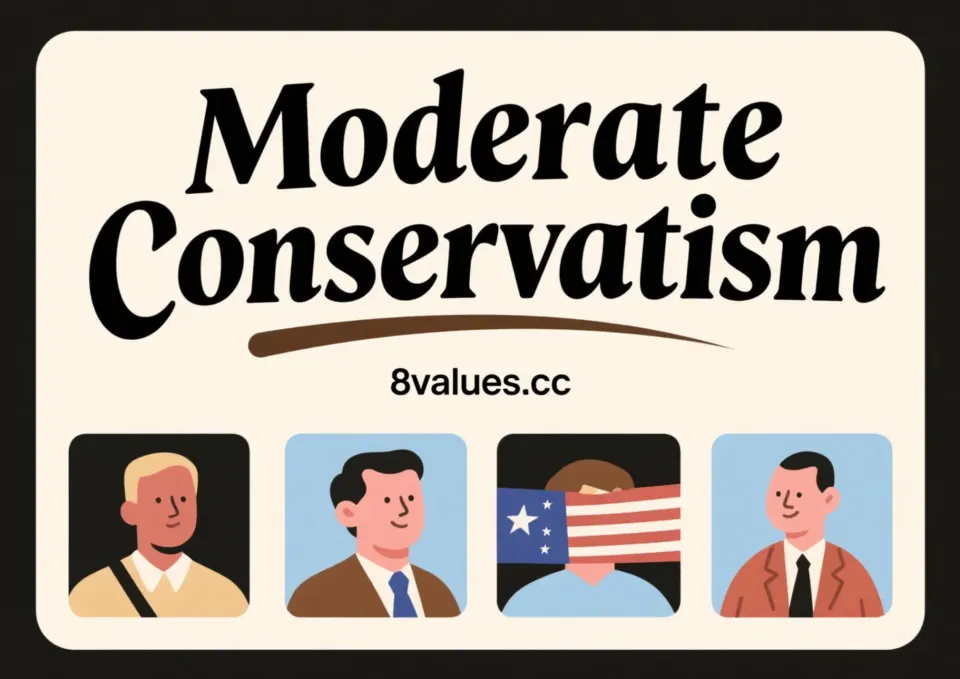Ecological Anarchism: the integration and critique of anarchism and ecological protection
Ecological Anarchism is a political philosophy school that combines anarchism and ecological perspectives, also known as Green Anarchism or Eco-Anarchism. It focuses on ecology and environmental issues, advocates the abolition of hierarchy, capitalism and state power, believes that these structures are the root cause of ecological crisis and social oppression, and advocates the establishment of a decentralized, local autonomy and ecologically sustainable social model.
Ecological Anarchism is an important branch of anarchist thought that combines anarchism's core principle of rejecting all forms of coercive authority and hierarchy with profound ecological concern. This trend of thought is committed to solving the problems of ecological crisis and environmental degradation. It believes that environmental problems are rooted in social structures, especially the hierarchy and dominance relationships in human society.
If you are interested in this type of complex political value research and analysis, and want to understand your own tendencies towards authority, economic, social and even ecological issues, you can try professional online political ideology testing tools such as 8Values Political Test , 9Axes Political Test or LeftValues Political Test to help you locate your own tendencies.
Historical origins and ideological foundation
The ideological germination of ecological anarchism can be traced back to the classic anarchists and literary naturalists of the 19th century.
early influencers
The writings of Henry David Thoreau , especially Walden, are considered an important early influence on ecological anarchism. Thoreau promoted a simple life and self-sufficiency in the natural environment as a rebellion against the march of industrial civilization. His love of anti-consumerism and wilderness directly inspired many eco-anarchists.
Two geographers, Peter Kropotkin and Élisée Reclus, developed the naturalistic ideas of Mikhail Bakunin into ecological philosophy. Bakunin rejected Cartesian dualism and denied the anthropocentric and mechanical separation of humans and nature. In his book Mutual Aid: A Factor of Evolution, Kropotkin elaborated on the basis of social organization formed through the practice of mutual aid in the animal kingdom. He was also one of the first environmental thinkers to point out the connection between industrialization, environmental degradation, and worker alienation. Kropotkin advocated local economy , decentralization and degrowth (Degrowth), believing that this would strengthen the connection between people and the land and prevent environmental damage.
Recluse is considered the founder of modern ecological anarchism . He conceived the relationship between human society and nature as a dialectic, and advocated Total Liberation , directly comparing the exploitation of labor with the cruelty of animals, and advocating for the rights of humans and animals. Recluse's view is that Earth's history is a struggle for the free flourishing of humans and nature, against the dominant forces that limit that flourishing.
clearly form and develop
By the end of the 19th century, Anarcho -naturism emerged, which combined anarchism with naturist philosophical ideas. This trend of thought is particularly popular in places such as Spain, France and Portugal. It advocates organizing society into small, self-sufficient villages to minimize environmental impact, and promotes lifestyles including nudism and austere living.
As a clear political theory school, ecological anarchism was gradually formed in the context of the New Left in the 1960s and 1970s, with the revival of anarchism and the rise of the environmental movement. During this period, basic anarchist principles and practices, such as direct action and community organizing, became the basis for radical environmental thought.
Core Critiques and Principles of Ecological Anarchism
Eco-anarchism centers on the identification and dismantling of social hierarchies that lead to environmental degradation.
1. Anti-hierarchy and domination
Eco-anarchists believe that anthropocentric hierarchies are the main driver of the ecological crisis. Human beings’ domination of nature is a domination logic rooted in human society.
- Social class is the root cause: the hierarchical system that oppresses humans (such as class, gender oppression) directly precedes the exploitation of the environment by hierarchical society, thus leading to a vicious cycle of social and ecological destruction.
- Rejection of Authority: Anarchism rejects any form of domination or exploitation in philosophy and practice.
2. Criticism of Capitalism and the State
Eco-anarchism holds a radical environmental stance that is anti-capitalist and anti-authoritarian .
- Criticism of capitalism: Opposing the extractivism and productivism of industrial capitalism, believing that its pursuit of unlimited growth is inconsistent with limited natural resources. The profit-oriented principle of capitalism will inevitably lead to environmental destruction.
- The state is an accomplice: States and their government agencies are seen as responsible entities in the global environmental crisis. Countries, in order to maintain a competitive position with other countries, often promote industrial extraction and production, even at the expense of the environment. Ecological anarchism therefore opposes state sovereignty over the environment, as the state is not believed to have dominion over the environment.
3. Systematic criticism of civilization
Green anarchism traces the roots of social domination systems to "civilization" in a broad sense.
- The Beginnings of Civilization: Green Anarchism traces the roots of all forms of oppression to the widespread transition from a hunter-gatherer lifestyle to settled life. Agriculture introduced the concept of surplus and created the environment for the rise of a class system.
- The totality of institutions: “Civilization” is seen as the sum total of dominant institutions such as the state, capitalism, industrialization, globalization, domestication, patriarchy, science and technology. Civilization is responsible for the destruction of the environment and human freedom by prioritizing humans over the natural world.
Main schools: Multiple ecological liberation paths (Green Anarchism and Eco-Anarchism)
Eco-anarchism is not a single, overarching ideology, but a collection of diverse schools of thought and practices. Its main branches have significant differences in how to achieve goals and how to view technology.
1. Social Ecology
Founded by American social anarchist Murray Bookchin .
- Core idea: Environmental problems are rooted in social hierarchies and domination between people (e.g., state, class, gender oppression). Bookchin believed that human oppression of human beings preceded the exploitation of nature.
- Liberation path: A non-hierarchical social structure must be established to fundamentally solve the ecological crisis. He advocated the establishment of a rational and ecological society through social and cultural evolution .
- Organizational form: Advocates a decentralized direct democratic system, centered on local cities and towns , and envisions replacing the state with a popular assembly.
- Technological attitudes: Compared to primitivists, Bookchin is generally seen as having a positive attitude toward technology , leaning toward social ecology and a socialist ideology that seeks to preserve existing structures and industrial practices through "sustainable" and "eco-friendly" technologies. Bookchin believed that the appropriate use of technology could help achieve self-sufficiency and diversification of local economies.
2. Anarcho-Primitivism
Developed by John Zerzan and others.
- Core idea: Civilization itself is the root of all social problems. They believed that agriculture , technology and industrial civilization must be abolished.
- Liberation Path: Promoting a return to hunter-gatherer society or a “wild” lifestyle. They believe that before the advent of agriculture, human society for millions of years was largely a life filled with leisure, close contact with nature, sexy intelligence, gender equality and health .
- Technological attitude: A deeply pessimistic stance towards technology, believing that technology is authoritarian, mediated, and ecologically violent. However, not all primitivists support a return to the Stone Age, some simply want to see the end of industrial society and may be positive about forms such as Permaculture .
3. Deep Ecology
Proposed by Norwegian philosopher Arne Næss in 1973.
- Core idea: Reject anthropocentrism in favor of biocentrism , which recognizes that all life (whether useful to humans or not) has intrinsic value .
- Practical proposition: It is believed that human society has no ability to reverse environmental degradation, so it proposes to significantly reduce the world's population . Solutions include bioregionalism and a return to hunter-gatherer life. Although deep ecology is not entirely a branch of anarchism, its non-anthropocentrism has similarities with ecological anarchism.
4. Green Syndicalism
Developed by Jeff Shantz and others.
- Core Idea: Seeking to integrate the labor movement with the environmental movement . It places the exploitation of labor under capitalism within a wider ecological context, arguing that environmental degradation is inseparable from social oppression.
- Liberation path: achieve ecological transformation through workers' self-management , and advocate deindustrialization , decentralization and localization of production. It rejected Marxist and traditional anarcho-syndicalist visions of the emancipatory potential of the industrial economy, but it also rejected calls from radical environmentalists for an immediate and complete discontinuation of industrialization .
5. Total liberation and ecofeminism
- Total Liberation: A philosophy that incorporates animal rights and ecological justice into the anarchist struggle. Its supporters such as Steven Best believe that because animals have sentience and the ability to feel pain, moral concern should be extended to animals, and advocate the abolition of the hierarchy between humans and animals.
- Veganarchism: A combination of veganism (animal liberation) and green anarchism.
- Ecofeminism: Criticizes the logical homology between "dominance of women" and "dominance of nature" in patriarchal culture, and advocates overcoming the destructive power of patriarchal rule.
Practice and Eco-Social Vision
The political practice of ecological anarchism is mainly reflected in two aspects: direct action and the creation of alternative social structures .
Direct Action and Ecological Defense
Eco-anarchists are actively involved in struggles on various environmental issues, particularly in the global anti-nuclear movement, anti-road construction, and anti-industrial agriculture.
- Radical environmental movements: Organizations and groups such as Earth First! (Earth First!), the Earth Liberation Front (ELF), and the Animal Liberation Front (ALF) are committed to direct action against systems they consider persecutive, such as the logging industry, the meat industry, animal laboratories, and genetic engineering facilities. Their actions include monkey-wrenching , civil disobedience and ecotage .
- Anti-globalization: Green anarchists have played a key role in the Global Justice Movement (GJM), which uses a decentralized and non-hierarchical horizontal organization .
Building ecological communities and decentralized governance
Eco-anarchists not only rebel against the existing system, but also focus on creating alternative, sustainable lifestyles.
- Eco-villages and rewilding: Many green anarchists believe that small eco-villages (eco-villages) of no more than a few hundred people are a better scale of living than civilized society. They advocate rewilding , advocate simple living , and replace civilization with a way of living in harmony with nature.
- Local autonomy and mutual aid: advocates the establishment of a decentralized, local autonomous community. These communities manage resources through direct democracy and collective decision-making, promoting ecological agriculture and the sharing economy.
- "The Ecoanarchist Manifesto": "The Ecoanarchist Manifesto" officially adopted by the Green Anarchy International Association (GAIA) in 2002 emphasizes that anarchism without fully integrating ecology is not true anarchism; similarly, without anarchism from a social perspective, ecology is only authoritarian or pseudo-liberal semi-environmentalism . The manifesto makes clear that the policy foundations of eco-anarchism include: scientific knowledge based on ecology and the environment, humane treatment of food animals, intergenerational responsibility to leave the world to future generations better than we received it from our parents, a general suspicion of genetic manipulation, and rational, free-will socialist principles.
- Balance of political values: This school of thought attempts to achieve true democracy in the economic and political/administrative spheres, i.e., management and coordination without economic plutocracy and political/administrative statism , while also paying attention to ecological issues. The declaration emphasizes that self -sufficiency itself is not an anarchist principle, and the goal is to achieve ecological responsibility and political and economic equality through decentralized resource ownership and management.
If you are interested in this kind of analysis and positioning of political ideology, please feel free to follow the official blog of the 8Values Political Ideology Test website . We continue to provide professional interpretation and discussion of various schools of thought.






